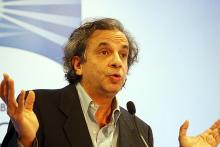What Is It
Gandhi is famous as the leader of the movement for Indian independence, which he based on his philosophy of non-violence, an important influence on Martin Luther King Jr. Gandhi's ideas and the effects of his leadership continue to influence the world and its leaders. What was the philosophical basis of these ideas? Is non-violence a strategy for a certain purpose, or the basis for a way of life? Ken and John welcome Akeel Bilgrami, Director of the Heyman Center for the Humanities at Columbia University and author of "Gandhi, the Philosopher."
Listening Notes
Though Gandhi was not a traditional philosopher, this may speak better of him than of traditional philosophers. Gandhi’s philosophy changed history in dramatic ways, though more by inspiring action than intellectual investigation, and despite his resistance to claiming a monopoly on truth.
After a brief pause for roving philosophical reporting, Ken and John ask their guest, Akeel Bilgrami, about how he became interested in Gandhi. Bilgrami tells Ken and John about his background, and then they launch into a discussion about how Gandhi’s actions related to his words: which drove which? What drove him to derive political strategy from first philosophical principles? They make some initial inroads into Gandhi’s philosophy and his critique of the enlightenment.
In the next section, Ken, John, and Akeel delve into Gandhi’s understanding of truth as a moral, rather than cognitive ideal, and of the well lived life as one of practical engagement, rather than one of intellectualized study. They relate these ideas to Gandhi’s critique of the Enlightenment, and in particular to Gandhi’s critique of the kind of modern politics that is rooted in Enlightenment political philosophy. Callers help Ken and John apply Gandhi’s thoughts to real world examples in modern politics, in the US and abroad. Akeel reminds them that Gandhi thought that rational argument wasn’t the only or best way to engage in politics: the most obvious alternative, violence, is clearly not the way to go, but Gandhi suggested another mode of engagement: modeling positive examples and touching people’s conscience.
In the last section, Ken and John ask Akeel what made Gandhi’s strategy successful, and what we can learn from Gandhi’s philosophy. Akeel discusses the necessity of not showing contempt for ‘ordinary’ people in a mass democracy. According to Gandhi, democratic masses can be corrupted by the ‘education’ of the media and manipulative institutions, but can learn to be real full and helpful citizens in popular movements that take place within democratic structures. Akeel touches on the fact that non-violence isn’t always practical – during World War II, for instance, Hitler’s actions needed violent reactions – but that non-violence has more going for it than what it often gets credit for.
- Roving Philosophical Reporter (seek to 6:10): Polly Stryker interviews Gandhi’s grandson, a leader of the ‘non-violent communication’ movement. He talks about the importance of seeing through criticism to understand criticizer’s needs, and of the effectiveness of his approach in dealing with real life problems in Pakistan.
- Philosophy Talk Goes to the Movies (seek to 45:45). Ken and John review ‘Gandhi’, an award winning three hour movie about Gandhi’s inspiring life. They note its noteworthiness for not being a sophomoric tale of male humor and violence, and for its importance in informing us of the background politics between India and Pakistan’s relationship today.

Comments (2)
Tim Smith
Thursday, September 9, 2021 -- 8:59 AM
This rebroadcast a profoundThis rebroadcast is a profound pivot in a meta Philoso?hy Talk sense. What would have been is now Gandhi. That is a form of ahimsa. As John said in his intro, Philosophers can bully in a written space with their words.
There are other real-life examples of ahimsa today. Zhang Zhan is likely to die in China for her reporting of the pandemic in Wuhan. I don’t know what Gandhi would think of censorship in Zhan’s case or vaccine technology, for that matter.
I don’t think much of Gandhi as a philosopher. Gandhi’s philosophy is unsexy. The world is sexed. Words are not as crucial to Gandhi as actions. This is perhaps the pivot here. Actions are not inherently philosophical. Violence is not inherently wrong. Context is important.
Harold G. Neuman
Saturday, September 11, 2021 -- 1:19 PM
Interesting notion. But, IInteresting notion. But, I think Gandhi as philosopher stretches even the broad realm of philosophy beyond practical limitations. He was, seems to me, a mystic. I prefer to regard them as shamen---or would the singular, shaman, be better? The crazy Russian was one. Even the great orator, Engersoll, filled the bill nicely for his century. Our array of public intellectuals also fit the fabric. Gandhi as non-violent pacifist is appropriate. To distinguish him as more feels over-generous. To me.. Sure. You have to stand for something---or fall for anything. Gandhi was a good man. He was not, in any broad sense,a philosopher, IMHO..If philosophy is narrowing more now, I wonder at the pragmatism of that.